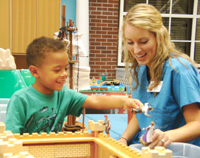|
Health care
experiences and hospitalization
can be stressful and overwhelming
to children and can lead to
feelings of fear, confusion, loss
of control, and isolation. If
these feelings are not addressed
they may have negative effects on
children's physical and emotional
health as well as inhibit normal
development. Children need to be
assisted when navigating medical
environments to help them
effectively cope with their
circumstances.
 Child life
specialist Cory Prescott visits
with Matthew Debarros in the
Children's Hospital Atrium. Child life
specialist Cory Prescott visits
with Matthew Debarros in the
Children's Hospital Atrium.
Many children
have misconceptions about medical
experiences and hospitalization.
For example, when a 6-year-old
patient came in for surgery he was
told that the doctors would make a
hole in his body. He asked, "Will
they use a shovel?" Another
patient thought the video
electroencephalogram could read
her thoughts.
Children also
may come with knowledge of someone
else's medical experiences that
can lead to misunderstandings and
anxiety. For example, a 4-year-old
patient came into the hospital,
but refused to get off his knees.
The medical staff was perplexed
and could not understand why he
would not stand. Through play, the
child expressed that his uncle had
gone to the hospital and had his
legs amputated and he was
protecting himself.
Children who
understand and are prepared for
medical events demonstrate less
fear and anxiety, and tend to more
effectively cope with future
medical experiences.
Here are a few
tips to help clarify children's
misunderstandings:
- Get
down on the child's eye level.
Kneel down when speaking with
children. This lets them know
you are interested in what
they have to say and helps
build rapport. By getting on
their eye level, you
demonstrate that the child is
important.
- Select
words carefully. Medical
jargon can be difficult for
children to understand. Be
sure to use clear, concrete
language and explain
everything in simple, sensory
terms. The chart below
contains a list of common
words or abbreviations that
can be confusing or
threatening.
- Offer
choices when possible.
Children in hospitals have
very little control over their
environment and routines. By
offering choices, you can
promote autonomy, which then
encourages coping. For
example, "Would you like to
take your bath before you eat
or after?" Also, it is
important to remember not to
offer a choice when one is not
available. An example of this
would be asking, "Do you want
to take your medicine now?"
You are not actually giving
the child a choice in this
situation.
- Give
the child a job to do. This
encourages children to become
active participants in the
medical experience or
procedure. For example, "Your
job today is to take deep
breaths and count to 10."
- Advocate
for comfort positioning.
Comfort
positioning can not only help
children be more cooperative
during procedures, but can
promote family-centered care.
Being in an upright position
supports a child's sense of
control.
- Offer
praise and encouragement.
Praise
and encourage things that the
child did well. For example,
you could say, "Great job
holding your arm still!" This
helps a child focus on the
positive things.
About
Our Staff
Child life specialists are experts
in the field of child development
with knowledge regarding the needs
of children in medical settings.
These professionals have earned a
bachelor's or master's degree, and
have undergone a rigorous
certification process including an
internship and certification exam.
Child life specialists provide
therapeutic play, self-expression
activities, developmentally
appropriate preparation, coping
strategies, and emotional support
to promote understanding, reduce
anxiety, and encourage
cooperation.
MUSC Children's Hospital has 11
child life specialists in all MUSC
inpatient units, the operating
room, ambulatory surgery, the
emergency department, procedural
areas and outpatient oncology
clinic.
To learn more
about MUSC's Child Life
Department, visit http://www.musckids.com
or call 792-8805.
|



 Child life
specialist Cory Prescott visits
with Matthew Debarros in the
Children's Hospital Atrium.
Child life
specialist Cory Prescott visits
with Matthew Debarros in the
Children's Hospital Atrium.